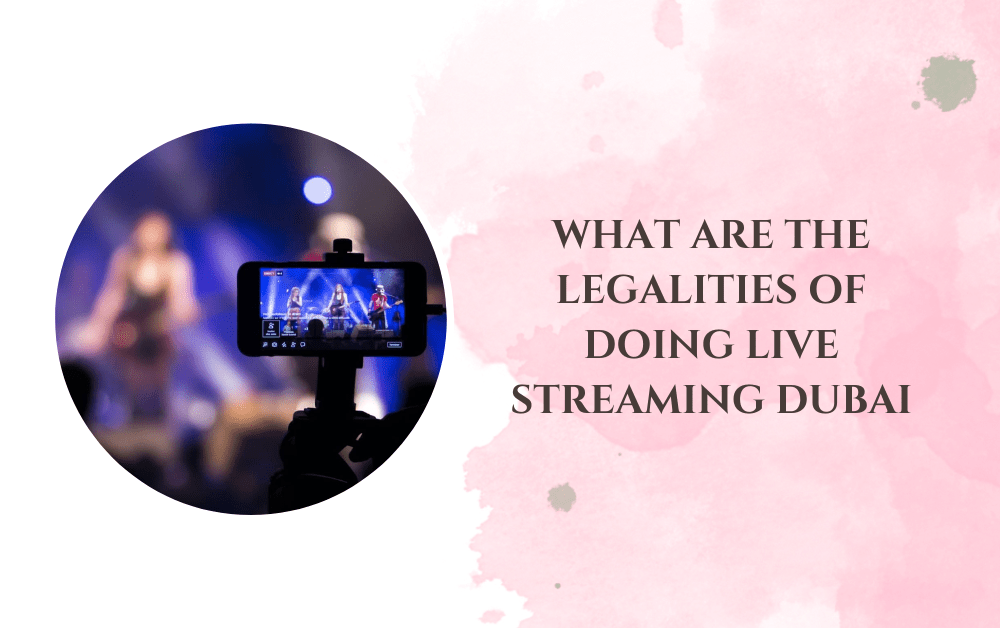Introduction to Live Streaming Legalities in Dubai
Live streaming in Dubai is a rapidly growing field with a lot of potential for content creators. However, it is governed by specific legalities that must be understood and followed to avoid any legal complications. This article aims to provide a detailed overview of the legal considerations associated with live streaming Dubai, covering everything from obtaining necessary permissions to respecting privacy laws and intellectual property rights. Understanding these legal requirements is crucial for anyone looking to engage in live streaming within the region.
Understanding the Need for Permits and Licenses
One of the first steps in legally streaming in Dubai is to ensure that you have all the necessary permits and licenses. Dubai’s media regulations are managed by the Dubai Media Office and other relevant authorities, which stipulate that any commercial filming or broadcasting activity must be approved beforehand. This includes live streaming for events, shows, or any public engagement. Obtaining these permits involves submitting a detailed description of the project, including its scope, locations, and the nature of the content to be streamed.
Respecting Privacy Laws and Consent
Privacy is a significant concern in live streaming, and Dubai’s laws strictly protect individuals’ privacy rights. It is crucial to obtain consent from people who will appear recognizably in your stream, especially if you are broadcasting in public spaces or private events. This extends to ensuring that you do not inadvertently capture footage of restricted areas or people who have not given their consent to be filmed. Failure to adhere to these privacy norms can lead to hefty fines and legal action.
Adhering to Content Guidelines
Dubai has stringent regulations regarding the type of content that can be broadcasted. Content that is considered offensive, harmful, or contrary to public morals, ethics, and the customs of the UAE is strictly prohibited. This includes any content that might incite hatred, discrimination, or violence. Live streamers must ensure their content is free of anything that could be considered disrespectful to the cultural, religious, and moral values of the UAE. Regular reviews and monitoring of the content can help in staying compliant with these regulations.

Intellectual Property Considerations
When live streaming in Dubai, it’s important to respect intellectual property laws. This includes using music, video clips, or any other copyrighted material legally. Unauthorized use can lead to legal issues and penalties. It’s advisable to either use royalty-free or licensed music and content or to create original content that does not infringe on the intellectual property rights of others. Additionally, understanding the rights you hold over your broadcast content is also crucial.
Navigating Advertising and Sponsorship Regulations
For those who monetize their live streams through advertising or sponsorships, understanding the legalities surrounding these aspects is essential. Dubai’s laws require that any advertisements or sponsorships are clearly identified as such in the stream. The terms of any sponsorship should be transparent, and claims about products or services should be substantiated to avoid misleading viewers. It is also important to ensure that all sponsors or advertised products comply with the broader legal standards and regulations of advertising in the UAE.
Handling Data and Cybersecurity Issues
Data protection and cybersecurity are critical in the digital age, especially when live streaming involves collecting and managing viewer data. Dubai adheres to strict data protection regulations to ensure that personal information is handled securely and with utmost privacy. Streamers must ensure that their platforms are secure, data collection complies with legal standards, and any potential data breaches are addressed promptly and efficiently.
Legal Consequences of Non-Compliance
Non-compliance with any of the legal requirements for live streaming in Dubai can lead to serious consequences. These can range from fines and the suspension of streaming activities to more severe penalties such as legal proceedings and potential imprisonment for serious offenses. Therefore, staying informed about the latest regulations and frequently consulting with legal experts in media law within the UAE can help in maintaining compliance and avoiding legal pitfalls.
Conclusion: Ensuring Legal Compliance in Live Streaming
In conclusion, navigating the legal landscape of live streaming requires constant vigilance. By understanding copyright, privacy, and content restrictions, streamers can protect themselves and their channels. Utilizing clear disclaimers, obtaining permissions, and staying updated on platform guidelines are crucial. Building a culture of responsible streaming fosters a safe and engaging environment. Remember, legal compliance empowers streamers to focus on creating high-quality content and fostering vibrant online communities.
Note :- To Read More Articles Visit on- xpressarticles

